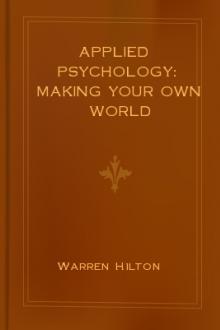Genre Psychology. Page - 4

must be, in the nature of things, a latent capacity greater than has yet been discovered. And one discovery must lead to another until the man finds the deep wealth of his own possibilities. History is full of the acts of men who discovered somewhat of their own capacity; but history has yet to record the man who fully discovered all that he might have been."
[Sidenote: "Acres of Diamonds"]
You who are a bit vain of your visits to other lands, your wide reading, your experience of men and things; you who secretly lament that so little of what you have seen and read remains with you, behold, your "acres of diamonds" are within you, needing but the mystic formula that shall reveal the treasure!
THE MECHANISM OF RECALL
[Illustration: Decorative Header]
CHAPTER III
THE MECHANISM OF RECALL
[Sidenote: The Right Stimulus]
Somehow, somewhere, all experiences, whether subject to voluntary recall or not, are pre

an and ends in a muscle. This statement represents the general scheme well enough, but leaves out an important detail. The nerve does not extend directly to a muscle, but ordinarily goes by way of the brain. The brain is merely a great group of nerve cells and fibers which have developed as a central organ where a stimulation may pass from almost any sense organ to almost any muscle.
But another importance attaches to the brain. When a sense organ is stimulated and this stimulation passes on to the brain and agitates a cell or group of cells there, we are conscious. Consciousness shifts and changes with every shift and change of the stimulation.
The brain has still another important characteristic. After it has been stimulated through sense organ and nerve, a similar brain activity can be revived later, and this revival is the basis of memory. When the brain is agitated through the medium of a sense organ, we have sensation; when this agitation is revived later, we hav

nt pasture for dairy-farming and water-power for both tramway and funicular, and where the necessary capital could be borrowed; and the other one hunted about for marks of stratification and upheaval, and ransacked his memory for historical data about the various tribes originally inhabiting that country.
"I suppose you're a painter and regretting you haven't brought your sketching materials?" said the scientific man, always interested in the causes of phenomena, even such trifling ones as a man remaining quiet before a landscape.
"I reckon you are one of those literary fellows, and are planning out where you can use up a description of this place"--corrected the rapid insight of the practical man, accustomed to weigh people's motives in case they may be turned to use.
"I am not a painter, and I'm not a writer"--exclaimed the third traveller, "and I thank Heaven I'm not! For if I were I might be trying to engineer a picture or to match adjectives, instead of merely enjoy

nd held onto the sticks that were over the sluice planks and so came safely and dry over the water. Then I asked the old miller how many water wheels he had. "Ten," answered he. The adventure stuck in my mind. I should have gladly known what the meaning was. But as I noticed that the miller would not leave I went away, and there was in front of the mill a lofty paved hill, on which were some of the previously mentioned elders who walked in the sun, which then shone very warm, and they had a letter from the whole faculty written to them, on which they were consulting. [In our modern mode of expression, the elders had directed a letter to the sun, and so I find the passage in an English version of the parable. This generally bungling translation is nevertheless not in the least authoritative. And although an acceptable meaning is derived from it, if one regards the sun as the just mentioned "prince," yet I believe a freer translation should be given ... the elders walked in the warm sunshine; they consulted abo

m dare askand then answer the question we clones avoid like the plague, he doesso with relentless, laser-like precision. Read his book. Take your seatat the double-headed microscope and let Sam guide you through thedissection. Like a brain surgeon operating on himself, Sam explores andexposes the alien among us, hoping beyond hope for a respectable tumourbut finding instead each and every cell teaming with the same resistantvirus. The operation is long and tedious, and at times frightening andhard to believe. Read on. The parts exposed are as they are, despitewhat may seem hyperbolic or far-fetched. Their validity might not hithome until later, when coupled with memories of past events andexperiences.
I am, as I said, my own worst nightmare. True, the world is repletewith my contributions, and I am lots of fun to be around. And true,most contributions like mine are not the result of troubled souls. Butmany more than you might want to believe are. And if by chance you getcaught in my Web, I c

re on the baseball diamond or the football gridiron: readiness to do everything, or anything--or to do nothing, if he is so directed--in the interests of the team. It must take a leaf from the book of General Pershing and his fellow officers who, in a time of stress for the Allies, were willing and eager to brigade their troops with the soldiers of France and England, thus losing the identity of their forces in the interest of the great cause for which they stood. It must learn the lesson taught by the life of Him who emptied Himself for the sake of the world--and did it with a smile.
III
FORGIVING INJURIES
A gifted writer has told the story of a workman in a Bessemer steel furnace who was jealous of the foreman whom he thought had injured him. The foreman was making a good record, and the workman did not want to see him succeed. So he plotted his undoing--he loosened the bolts of the cable that controlled an important part of the machinery, and so caused an accident that not only interfe

heancients denominated destiny, nature, or providence, which wecall the voices of the dead, and whose power it is impossible tooverlook, although we ignore their essence. It would seem, attimes, as if there were latent forces in the inner being ofnations which serve to guide them. What, for instance, can bemore complicated, more logical, more marvellous than a language?Yet whence can this admirably organised production have arisen,except it be the outcome of the unconscious genius of crowds?The most learned academics, the most esteemed grammarians can dono more than note down the laws that govern languages; they wouldbe utterly incapable of creating them. Even with respect to theideas of great men are we certain that they are exclusively theoffspring of their brains? No doubt such ideas are alwayscreated by solitary minds, but is it not the genius of crowdsthat has furnished the thousands of grains of dust forming thesoil in which they have sprung up?
Crowds, doubtless, are always uncon

tion Process]
The other aspect of the Sense-Perceptive Process has to do with the mental interpretation of environment.
Both these aspects are distinctly practical.
You should know something of the weaknesses and deficiencies of the sense-perceptive organs, because all your efforts at influencing other men are directed at their organs of sense.
You should understand the relationship between your mind and your environment, since they are the two principal factors in your working life.
CHAPTER III
SENSORY ILLUSIONS AND SUGGESTIONS FOR THEIR USE
[Sidenote: Unreliability of Sense-Organs]
Figure 1 shows two lines of equal length, yet the vertical line will to most persons seem longer than the horizontal one.
[Illustration: FIG. 1.]
In Figure 2 the lines A and B are of the same length, yet the lower seems much longer.
[Illustration: FIG. 2.]
Those things lo

p>The most important of these laws is the Law of Habit. In obedience to this law, the next idea to enter the mind will be the one that has been most frequently associated with the interesting part of the subject you are now thinking of.
The sight of a pile of manuscript on your desk ready for the printer, the thought of a printer, the word "printer," spoken or printed, calls to mind the particular printer with whom you have been dealing for some years.
The word "cocoa," the thought of a cup of cocoa, the mental picture of a cup of cocoa, may conjure with it not merely a steaming cup before the mind's eye and the flavor of the contents, but also a daintily clad figure in apron and cap bearing the brand of some well-known cocoa manufacturer.
If a typist or pianist has learned one system of fingering, it is almost impossible to change, because each letter, each note on the keyboard is associated with the idea of movement in a particular finger. Constant use has so welded th
